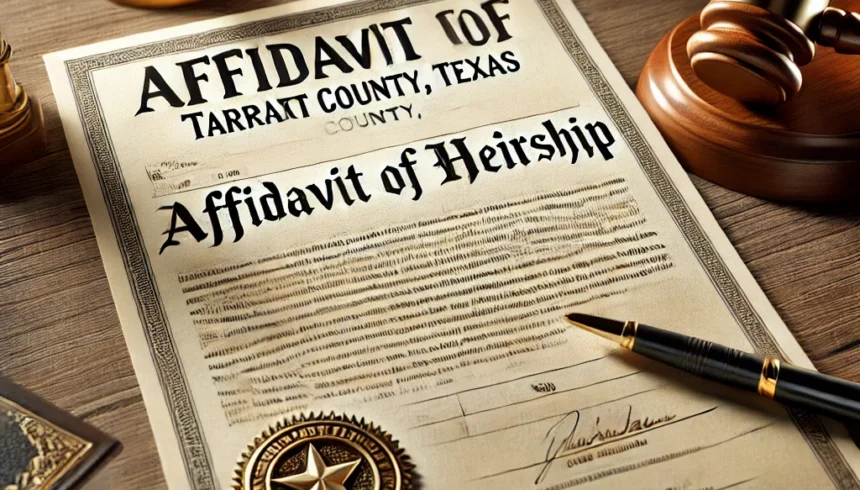
 By Evan Lange
By Evan Lange
Before proceeding, please review the legal disclaimer.
When someone passes away in Texas without a will, the transfer of property or assets to their heirs can be a complicated process. In such cases, an affidavit of heirship for Tarrant County in Texas is often used to establish legal ownership of the deceased person’s property. This document serves as a straightforward and cost-effective alternative to probate, particularly for families dealing with modest estates.
In this article, we’ll dive into what an affidavit of heirship is, how it is used specifically in Tarrant County, and why it’s an important tool for Texans navigating property inheritance.
An affidavit of heirship for Tarrant County in Texas is a legal document used to identify the rightful heirs of a deceased person who died without a will. This document is filed in the county records and helps transfer real property, such as a home or land, to the heirs.
In Tarrant County, which includes cities like Fort Worth and Arlington, this document is commonly used to avoid lengthy probate processes. It is often prepared with the help of attorneys or other qualified professionals who understand Texas inheritance laws.
The affidavit of heirship for Tarrant County in Texas is typically used in situations where:
It is important to note that while an affidavit of heirship is a useful tool, it is only effective for transferring property ownership. It does not cover debts or other estate matters that may require a separate legal process.
An affidavit of heirship for Tarrant County in Texas must include specific information to be legally valid. These components typically include:
This ensures the affidavit is accurate and can be relied upon during the property transfer process.
In Tarrant County, Texas, the affidavit of heirship is particularly significant for avoiding the time-consuming and costly probate process. Probate can take months or even years, depending on the complexity of the estate, while an affidavit of heirship can streamline the transfer of property ownership.
The document is also a valuable tool for families who want to preserve privacy, as probate records are public, while the affidavit is generally more discreet.
Once the affidavit is completed and notarized, it must be filed with the county clerk’s office in Tarrant County. Filing the document ensures it becomes part of the public record, allowing third parties—such as title companies or banks—to verify the rightful ownership of the property.
The Tarrant County Clerk’s Office is responsible for maintaining these records and can provide guidance on filing requirements. However, it’s essential to ensure the affidavit is properly prepared to avoid rejection or delays.
While the affidavit of heirship for Tarrant County in Texas is a convenient option, there are potential challenges to consider:
It’s always advisable to consult a professional who understands the intricacies of Texas property laws when dealing with an affidavit of heirship.
For families in Tarrant County, the affidavit of heirship provides a cost-effective way to manage property inheritance without entering probate. Key benefits include:
While an affidavit of heirship can often bypass the need for probate, it does not entirely replace the probate process in every situation. Probate may still be necessary if:
In these cases, the affidavit can complement other legal tools, but additional action may be required.
When filing an affidavit of heirship for Tarrant County in Texas, consider the following:
While the affidavit of heirship is a straightforward document, mistakes in its preparation or filing can lead to significant delays or legal disputes. Many families in Tarrant County choose to work with legal professionals to ensure the affidavit is accurate and meets all local requirements.
What is an affidavit of heirship for Tarrant County in Texas?
It is a legal document used to establish the heirs of a deceased person who passed away without a will.
Can I use an affidavit of heirship for all types of property?
The affidavit is primarily used for real property, such as land or homes. It is not typically used for assets like bank accounts or vehicles.
Does the affidavit of heirship transfer ownership immediately?
No, it establishes legal ownership, but additional steps may be required to update property records with title companies or other entities.
Do I need witnesses for the affidavit of heirship?
Yes, at least two disinterested witnesses must sign the affidavit to verify the information provided.
Is the affidavit of heirship valid outside of Tarrant County?
While it may be recognized across Texas, specific filing requirements or property laws could vary by county.
An affidavit of heirship for Tarrant County in Texas is an essential tool for families dealing with property inheritance when no will exists. By simplifying the transfer of real property, it offers a cost-effective and efficient alternative to probate.
For those navigating this process, understanding the requirements and potential challenges specific to Tarrant County can make a significant difference. With proper preparation and, if necessary, professional assistance, families can ensure a smoother transition of property ownership.
For additional probate information visit the Probate Home Page .
Follow our newsletter to stay updated.

2025- The Lange Firm all rights reserved.

Mr. Evan B. Lange is the attorney responsible for this website. | All meetings are by appointment only. | Principal place of business: Sugar Land, Texas.
The information you obtain at this site is not, nor is it intended to be, legal advice. You should consult an attorney for advice regarding your individual situation. We invite you to contact us and welcome you to submit your claim for review. Contacting us does not create an attorney-client relationship. Please do not send any confidential information to us until such time as an attorney-client relationship has been established.